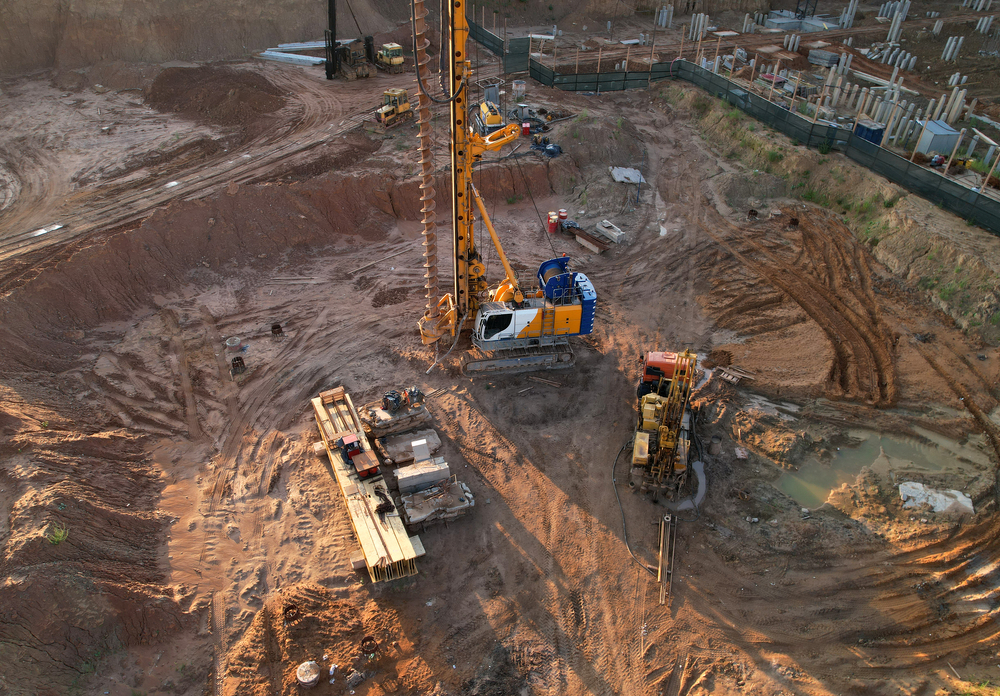Our Geotheta PDFs
Wiki Article
How Geotheta can Save You Time, Stress, and Money.
Table of ContentsRumored Buzz on GeothetaThe smart Trick of Geotheta That Nobody is DiscussingGeotheta - The FactsGeotheta Fundamentals ExplainedSee This Report on Geotheta

They conduct site examinations, accumulate samples, do lab tests, and assess information to examine the suitability of the ground for construction jobs - Geo Tech Engineer. Based on their findings, geotechnical designers offer recommendations for foundation style, incline security, maintaining structures, and mitigation of geotechnical threats. They work together with other specialists, such as engineers, architectural designers, and building teams, to guarantee that geotechnical factors to consider are incorporated right into the overall project layout and implementation
By examining the habits and residential properties of soil and rock, they can identify prospective geotechnical threats such as landslides, dirt settlement, or slope instability. Their experience assists avoid failings or crashes that can threaten lives and residential property. Below are some comprehensive responsibilities and duties of a geotechnical engineer: Website Examination: Geotechnical designers conduct website examinations to collect data on subsurface problems.
They translate the data to understand the residential properties and actions of the soil and rock, including their toughness, permeability, compaction characteristics, and groundwater problems. Geotechnical Evaluation and Layout: Geotechnical designers evaluate the data collected throughout website examinations to evaluate the security and viability of the site for building tasks. They execute geotechnical calculations and modeling to assess elements such as bearing capability, negotiation, incline stability, lateral earth stress, and groundwater flow.
The Basic Principles Of Geotheta
Foundation Layout: Geotechnical designers play a crucial function in making foundations that can securely support the designated framework. They evaluate the dirt conditions and load demands to figure out the proper foundation kind, such as shallow foundations (e.g., grounds), deep structures (e.g (https://www.tripadvisor.in/Profile/geotheta1)., stacks), or specialized methods like dirt renovation. They consider aspects such as settlement restrictions, birthing ability, and soil-structure interaction to develop optimum foundation stylesThey examine construction plans, display website activities, and perform field inspections to confirm that the layout recommendations are complied with. If unexpected geotechnical problems emerge, they evaluate the circumstance and give recommendations for remediation or adjustments to the style. Risk Assessment and Reduction: Geotechnical engineers analyze geotechnical threats and dangers connected with the job website, such as landslides, liquefaction, or soil disintegration.

Cooperation and Communication: Geotechnical engineers function carefully with other professionals associated with a project, such as architects, structural designers, and building and construction teams. Efficient communication and partnership are necessary to incorporate geotechnical considerations into the overall project style and building procedure. Geotechnical engineers offer technological proficiency, response inquiries, and make sure that geotechnical demands are fulfilled.
Geotheta for Dummies
Below are some kinds of geotechnical designers: Foundation Engineer: Foundation designers specialize in making and assessing structures for frameworks. They evaluate the dirt problems, tons demands, and site attributes to figure out one of the most ideal structure kind and design, such as shallow foundations, deep structures, or specialized techniques like stack structures.They assess the aspects influencing incline security, such as dirt properties, groundwater problems, and incline geometry, and establish methods to avoid slope failings and minimize threats. Earthquake Engineer: Quake engineers specialize in analyzing and developing structures to stand up to seismic pressures. They evaluate the seismic threat of a website, examine soil liquefaction possibility, and develop seismic layout requirements to ensure the safety and resilience of frameworks during quakes.
They do area screening, gather examples, and assess the accumulated information to define the soil buildings, geologic formations, and groundwater problems at a site. Geotechnical Instrumentation Designer: Geotechnical instrumentation engineers concentrate on surveillance and gauging the behavior of soil, rock, and structures. They install and preserve instrumentation systems that check elements such as dirt settlement, groundwater levels, incline activities, and architectural variations to analyze efficiency and offer very early cautions of prospective issues.
The Ultimate Guide To Geotheta
They conduct tests such as triaxial examinations, consolidation tests, direct shear examinations, and leaks in the structure examinations to gather information for geotechnical evaluation and design. Geosynthetics Engineer: Geosynthetics engineers specialize in the style and application of geosynthetic materials, such as geotextiles, geogrids, and geomembranes. They make use of these materials to boost soil security, reinforce inclines, provide drain services, and control erosion.They have a tendency to be investigative individuals, which suggests they're intellectual, reflective, and inquisitive. They are interested, methodical, sensible, logical, and sensible. Some of them are additionally social, meaning they're kind, charitable, cooperative, individual, caring, valuable, empathetic, sensible, and friendly - Geo Tech Engineer.
In the workplace setting, geotechnical engineers make use of specialized software application tools to carry out calculations, produce styles, and examine data. They prepare records, evaluation project specifications, communicate with customers and group participants, and that site coordinate job tasks. The workplace setting provides a conducive atmosphere for research, evaluation, and collaboration with other professionals involved in the project.
Geotheta for Beginners
They often see task websites to perform site examinations, evaluate geotechnical problems, and gather information for evaluation. These check outs involve traveling to various locations, sometimes in remote or tough surfaces. Geotechnical designers may perform soil sampling, conduct examinations, and screen building and construction tasks to make certain that the geotechnical aspects of the job are being executed correctly.Geotechnical engineers likewise work in specialized geotechnical labs. Geotechnical laboratory designers work extensively in these atmospheres, handling testing tools, operating tools, and tape-recording data.
Report this wiki page